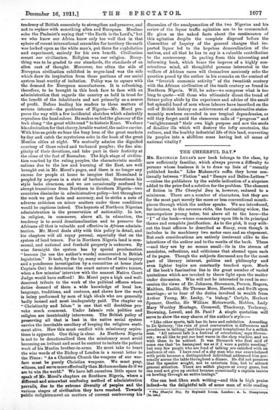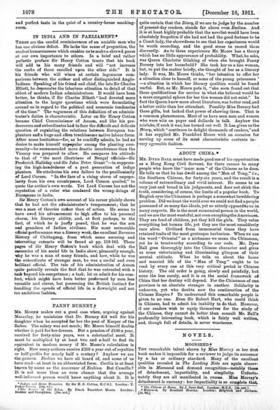THE CHEERFUL DAY.*
MR. REGINALD LIMAS'S new book belongs to the class, by now sufficiently familiar, which always proves a difficulty to
persons whose business it is to draw up lists of "recently published books." Like Mahomet's coffin they hover con- tinually between " Fiction " and "Essays and Belles-Lettres " —unless the publishers by the subtle indication of a sixpence
added to the price find a solution for the problem. The element of fiction in The Cheerful Day is, however, reduced to a
minimum. There are a number of characters, but they are for the most part merely the more or leas conventional mouth- pieces through which the author speaks. We are introduced, for instance, to the nouveau riche, the fascinating widow, the unscrupulous young tutor, but above all to the hero—the "I" of the book—whose commentary upon life is its principal theme and complete justification. As to the plot, it may with- out the least offence be described as flimsy, even though it includes in its machinery two motor cars and an elopement.
But such considerations are entirely irrelevant alike to the intentions of the author and to the merits of the book. These —and they are by no means small—lie in the stream of anecdotes, reflections, and criticisms that abound upon each of its pages. Though the subjects discussed are for the most part of literary interest, politics and philosophy and even lighter topics are constantly touched upon. Much
of the book's fascination lies in the great number of varied quotations which are invoked to throw light upon the matter under discussion. Who will not be interested to read in suc- cession the views of Dr. Johnson, Stevenson, Poison, Rogers, Malthus, Hazlitt, Sir Thomas More, Herrick, and Swift upon
marriage ; or to hear of the duties involved in wealth from Arthur Young, Mr. Lecky, "a bishop," Carlyle, Herbert Spencer, Goethe, Sir William Molesworth, Hobbes, Lady Mary Wortley Montagu, Cromwell, Thackeray, Trelawny, Browning, Lowell, and St. Paul ? A single quotation will serve to show the easy charm of the author's style:—
"Like other sports, talk has its laws and subtleties. According to De Quincey, 'the ruin of good conversation is diffuseness and greediness in talking,' and there are great temptations for a selfish man. natural talk is a festival of ostentation,' says Steven- son ; we all like to put our best wares in the shop window, and we wish them to be noticed. It was Bismarck who first said of some one that 'he harangued me as if I were a public meeting,' but very few people who are fond of talking are satisfied with an audience of one. I have read of a shy man who was overwhelmed with pride because a distinguished individual addressed him per- sonally across the table throughout a dinner. He did not perceive that the speaker sought, not to entertain him, but to attract general attention. There are selfish players at every game, but one need not give up cricket because occasionally a captain inaista on bowling through an entire innings."
One can best liken such writing—and this is high praise indeed—to the delightful talk of some man of wide reading • T7s4 Cheerful Day. By Reginald Lucas. Loudon: A. I.. Hunspbreyn. [Si. net.) and perfect taste in the quiet of a country-house smoking- room.



















































 Previous page
Previous page